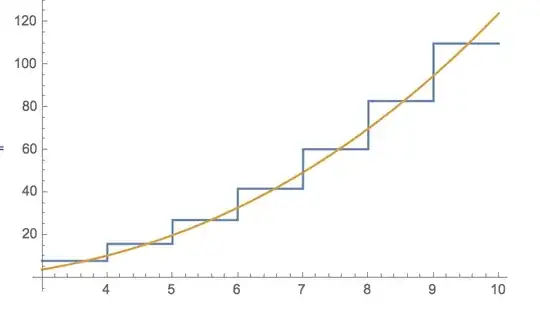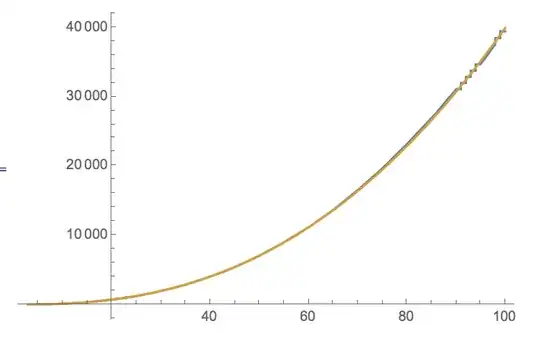As the title says, I'm stuck trying to find an expression for $\sum_{n=a}^b n^{q}$, with q being a positive rational number but not an integer, which does not demand unfeasibly long computation times for large ranges of $b-a$. From the application where this problem originated from, the limitation $1<a<b$ applies, it is acceptable to set $a=2$ and calculate for higher starting values by subtraction, and $q=1.5$, though it may be more interesting to investigate this issue in general.
Applying the Euler-Maclaurin formula to this sum yields: $$\sum_{n=a}^b n^q = \frac{(b^{q+1}-a^{q+1})}{q+1}+\frac{(b^{q}+a^{q})}{2}+\sum_{k=1}^\infty \left(\frac{B_{2k}}{(2k)!}*(b^{q+1-2k}-a^{q+1-2k})*\prod_{i=1}^{2k-1}(q+1-i)\right)$$ for all non-integer $q$,where $B_{2k}$ are the even Bernoulli numbers.
The issue is that the series arising here is divergent, with alternating signs and increasing absolute values.
Subtracting the first two terms of the right hand side of the equation from the computed sum for which we sought an expression to begin with allows to summate this divergent series numerically. For $a=2$ and $q=1.5$, a pretty good curve fit for this difference is $0.166*b^{0.478}-1$ for up to about a million with $R^2=0.994$, but the behavior changes for even bigger values of b.
Partial sum development for the divergent series does not yield satisfying results either, any partial sum deteriorates the result compared to leaving it out entirely and only have the first two terms of the right hand side of the equation evaluated.
Since the computation time for the entire sum gets unfeasibly long for really large values of b and the numerical calculation of the sum does not allow to draw any rational conclusions in respect to the optimization problem in which this sum came up in the first place, I'd like to apply a proper summation method for divergent series to evaluate this difference.
Unfortunately the underlying sequence is obviously quite complicated and the Bernoulli numbers are difficult to account for with general methods.
Therefore, I have to ask for help with this issue, be it for the specified case with $q=1.5$ and $a=2$ or the general case if something can be said about the latter.
Which summation method is best applicable to the aforementioned divergent series?
What solution would it yield?
If that's not possible, could you propose an approximation formula for this difference whose best fit parameters will not change for values of b lying outside the range from which the numerical support of the fit was drawn, i.e. which adequately reflects the influence of the covered range of b on the value of this difference?
Help with this would be highly appreciated. Thank you in advance!


There seem to be some efficient methods to compute the Hurwitz zeta - at least Google gives links to some papers - by Mark W. Coffey and by Linas Wepstas, for example.
– მამუკა ჯიბლაძე Sep 27 '15 at 14:20